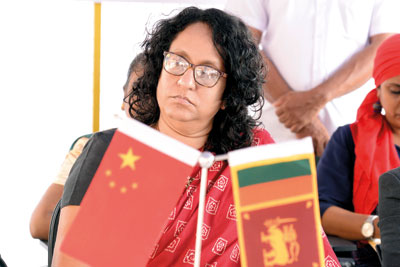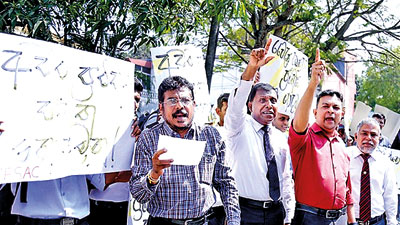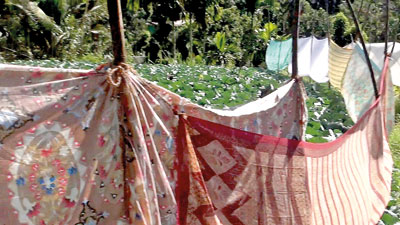Columns
Diplomatic gaffes embarrass Lanka’s friendly nations
View(s): 116
A huge diplomatic gaffe came to pass this week when Prime Minister Dr. Harini Amarasuriya thanked Taiwan, China’s arch-enemy, for an “incredibly generous donation” given—and said so in the presence of the Chinese Ambassador Qi Zhenhong to boot.
The event was the handing over of clothing material for school children by the Government of the People’s Republic of China (PRC) to the Government of the Democratic Socialist Republic of Sri Lanka. Instead, Dr. Amarasuriya thanked the ‘Republic of China’ (ROC)—the official name for Taiwan, with whom the PRC is on the verge of war. Sri Lanka has no diplomatic ties with the ROC either and in fact does not recognise the breakaway state.

Prime Minister Harinia Amarasuriya at the Colombo Port ceremony to receive China’s school uniform donation
The entire day began on the wrong footing with the prime minister’s absence at the ceremony at the Colombo Port and the Chinese ambassador kicking his heels waiting for her. Unable to stomach this—looking a gift horse in the mouth, the envoy fled back to the air-conditioned comfort of his office. He returned almost an hour later for the ceremony when the PM eventually arrived and then must have jolted in his seat when she thanked their enemy for the expensive gift.
One can only overlook the diplomatic bloopers and blunders made by the newbies in the new government as teething problems, much to the embarrassment of Sri Lanka’s friendly nations.
On Monday, the Iraqi embassy held a gala event in a Colombo five-star hotel to celebrate 100 years of Iraq’s
diplomacy. However, despite
it being Industries and Entrepreneurship Development Minister Sunil Handunnetti’s turn to attend diplomatic functions in December, he failed to appear.
Neither was there anyone to substitute him. It seemed that neither Minister Handunnetti’s office nor the Foreign Ministry’s protocol division informed the Iraq embassy about the minister’s inability to attend the ceremony.
The function went ahead without a single Sri Lankan government representative attending, although Sri Lanka’s national and Iraqi national flags were on the stage. Honouring the invitation, Opposition Leader Sajith Premadasa was present and stood out. Only the other day, the President, in his parliamentary opening address, referred to his government’s foreign policy as being to be redirected towards increasing trade overseas.
Oil-rich Iraq is not just another country. It is Sri Lanka’s number one tea buyer, accounting for 27.11 million kgs of Sri Lanka’s tea exports in the first ten months of this year. Iraq is a founding member of the United Nations and was also a member of the League of Nations, the predecessor to the UN.
Supposedly reluctant candidate in trouble over campaign finance statement
The deadline to submit financial statements for candidates who contested the November 14 parliamentary elections ended on December 6.
For most of the candidates, it was not too difficult to submit their reports detailing the actuals of what they spent for their campaign.
There are some candidates, however, whose signatures were obtained for the nomination list but were not involved in the campaign.
One such candidate asked the officials involved in collecting the statements related to campaign finance laws how his name came on the nomination list.
He claimed that while he was walking on the road, someone he knew approached him and obtained his signature through deceit. It was only later when he received a letter requesting his election finance report that he understood the gravity of his action. The supposedly reluctant candidate, whose name was on an Independent Group list, panicked upon learning about the penalties he could face for failing to provide information on the income and expenses related to the election.
He said he did not actively participate in the election and admitted, “I don’t even know how to fill out these reports.”
This incident highlights critical concerns about accountability and transparency in the nomination process. It emphasises the importance of strict oversight and public awareness initiatives to prevent similar issues in the future.
It will not be easy, however, for this ‘candidate’ to plead ignorance. There is the legal principle, ‘ignorantia legis neminem excusat,’ or ignorance of the law excuses no one, and was he going to be like those MPs who once signed an impeachment motion against President R. Premadasa and said later, “We thought this (impeachment) document was something to apply for a duty-free car”?
Movies, memes and computer game themes: police armed with creative humour

New approach in crime busting
Police have found a clever way to engage the public by blending crime prevention with humour through their social media channels.
Adopting a fresh approach, gone are the days of typical stiff warnings.
Some of the posts featured on police social media platforms blended movie magic and trending memes with real-world safety tips. For example, they gave us a friendly reminder stating: “Hey there! Just a friendly reminder to drive safely because, in an accident, you can’t heal your body like Wolverine or Deadpool”!
The messages also range from humorous warnings like, “Watch out for those smartphone zombies on the streets,” to more heartfelt cautions, such as, “Some of the most poisonous people come disguised as friends”, referring to the videogame of teamwork and betrayal: “Among Us”.
In keeping with their creative approach, the police also issued reminders wrapped in the thrill of escape games like “Temple Run” and “Subway Surfers.”
One post reminded us: “No thief can ever escape; they must be caught. Take a lesson from Temple Run”, and another read: “No one can evade the police forever; ultimately, you will be caught.” To raise awareness about cyberattacks, the police got creative with a meme of a hacker, captioned: “When you say you’re a hacker, but your password is 1234.”
For a more light-hearted approach to curb noisy honking, they turned to the viral “Chill Guy” meme, saying, “Make sure to stay calm and avoid unnecessary honking in traffic. Be a chill guy.”

Mr. Ranwala at an anti-SAITM protest
Ranwala’s pro-and-against private-degree past
The controversy over former Speaker Ashoka Sapumal Ranwala’s qualifications saw his past life as a trade unionist being looked up, and it unearthed some interesting details, available to anyone with a simple search on the internet.
Ranwala was president of the State Medical Faculties’ Parents Association during the controversy over the South Asian Institute of Technology and Medicine’s (SAITM) attempt to award medical degrees locally. He spearheaded protests against it in 2018, claiming it was a ‘degree shop’ where a degree could be bought for money, and questioned the standards of the SAITM degree. Media reports of these protests refer to him as ‘Prof. Ranwala.’
The protests were successful in that they led to SAITM ceasing operations, but Mr. Ranwala now has the integrity of his own higher education being questioned nationally, forcing him to step down as Speaker.
As it turns out, Waseda University, where he states he had his higher education, is also a private university—in Japan, awarding degrees!
The pros and cons of SAITM continue to be debated. Protagonists say it was to stop Sri Lankan students from spending foreign exchange to obtain foreign degrees. But Mr. Ranwala was strenuously against this.
An interesting footnote to this episode is a Facebook post by Mr. Ranwala’s deputy, Dr. Rizvie Salih.
Hours before Ranwala’s resignation, Dr. Salih, a foreign-qualified doctor, published a post that said, “I believe it is essential to maintain trust and accountability in leadership. In that spirit, I wish to share my professional qualifications openly. I hold an MBBS degree from Nishtar Medical College in Multan, Pakistan, completed in 1986, and a Diploma in Laryngo Otorhinology (DLO) from the University of Colombo. By sharing my qualifications, I aim to reaffirm the confidence of the people who have placed their trust in me.”
Heated exchanges at Jaffna DDC meeting
The Jaffna District Development Committee (DDC) meeting held on Friday saw some not-so-decent exchange of words among participants, including parliamentarians.
Presided by Minister and NPP National List parliamentarian R. Chandrasekar, the meeting saw the district MPs and Northern Province Governor N. Vethanayagan attending. The governor is yet to be appointed as the co-chair.
During the discussion, the controversial medical practitioner turned MP raised some questions from public officials. Not satisfied with the answers, he continued with follow-up questions.
The meeting saw heated exchanges. At one point, someone was heard saying, “Those who need psychological help should leave.”
At the end of the meeting, one civil society representative was heard telling his colleague that the meeting was a waste of his time with nothing being discussed productively, except for witnessing some stunts of self-serving politicians.
However, he raised a critical question: How can a National List MP—who is not elected by people in the district—be the chair of the DDC while others are sitting merely as observers? To which his friend responded, saying, “That’s the system change here.”

Sarees to the rescue
Saree fence keeps peacocks at bay
For decades, farmers and villagers have been grappling with the problem of wild animals and birds harming their crops without a proper solution.
The issue has now turned out to be a national problem, with growing calls for the government to resolve it.
In the interim, villagers are trying out novel solutions.
In the agricultural villages of Kandegedara and Idamgama in the Badulla area, the biggest harm to the crops is caused by peacocks. The villagers are now using sarees to fence off their cultivation plots, saying this is an effective method to ward off peacocks.
(Pic by Palitha Ariyawansa)
MPs’ educational qualifications: The RTI at work
The resignation of Speaker Ashoka Sapumal Ranwala on Friday after his educational qualifications were questioned has vindicated the Sunday Times’ continuous efforts in the past two years to publicise the educational qualifications of elected MPs.
When the parliamentary officials refused to divulge details for following a request in July 2021, the newspaper petitioned the Right to Information Commission (RTIC), which directed Parliament to publish MPs qualifications on its website.
Later, the Sunday Times pursued the status of the process through a fresh RTI application, to which the Parliament Secretary General’s office said a form was distributed among MPs to collect those details, and 208 of the 225 had declared their qualifications by January 8, last year.
The details can be accessed by logging onto the Parliament website, www.parliament.lk, and following this path: Home-Members of Parliament-Directory of Members.
Earlier, Parliament had taken the position that in terms of Articles 90 and 91 of the Constitution, MPs’ educational qualifications had not been ‘recognised’ as preconditions for entering Parliament.
Despite the RTI Commission directing Parliament earlier (2023) to collect information related to MPs who have been convicted or facing criminal charges, Parliament is yet to begin the process, according to the RTI response sent to the Sunday Times.
“It is our view that it is incumbent on Parliament to take requisite steps to obtain the information related to criminal charges from elected representatives of the Sri Lanka Parliament and to make the same available on public record,” the RTIC ruled in 2021.
